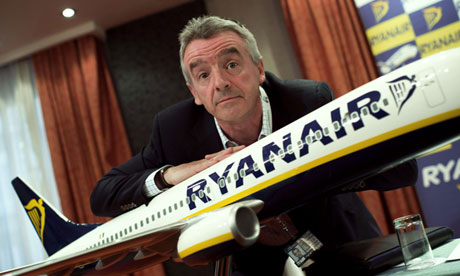Ryanair's shares are down by a fifth since July but are still 25% higher than they were in January. The erratic flight-path tells the tale of investors' confusion about airlines, especially the low-cost variety. The cause of previous optimism was the notion that a few golden years were in prospect.
On this view, battle-hardened winners like Ryanair and easyJet would reap the benefit of European consumers' looser spending, especially if the years of austerity have discouraged rivals from adding capacity.
But Ryanair put a dent in that theory with Wednesday's profit warning. Its chief executive, Michael O'Leary, said there had been "a perceptible dip in forward fares and yields into September, October and November".
A hot summer is one factor (sun-soaked punters pine less for an autumn break) but O'Leary's list of grumbles is long. It includes competitors' price action, capacity increases elsewhere, a weak pound and continuing European austerity measures.
That cocktail of explanations is far from convincing, however. Sterling's weakness against the euro has hardly been dramatic, and in any case Ryanair flies in both directions and also within the eurozone; and the eurozone itself looks less like an economic wasteland than it did.
Too much extra capacity too soon? That's more convincing since the airline industry has a long industry of over-optimism.
On the other hand, airline analysts struggle to identify all these supposed extra flights.
Perhaps, at the margin, Ryanair is simply becoming less popular. Could consumers finally be rebelling against all those credit card charges, in-your-face cabin adverts and remote airports?
Well, it's far too soon to conclude tastes are changing. This was, after all, only a modest profit warning; O'Leary merely said full-year after-tax profits would probably be within his announced €570m-€600m (£481.7m-£507m) range, rather than above, which is what the City had expected.
What is clear, though, is that he will reach for his traditional weapon on these occasions – more aggressive pricing. That's what upset share prices across the sector, including 5% off easyJet.
The founder, Sir Stelios Haji-Ioannou, may have missed the best moment to sell, if that's his intention for all or part of his family's 36.5% stake. Last month, he could have offloaded a few shares above £14; now he's looking at £12.
